Key takeaways:
- Emphasizing clean SQL principles—clarity, efficiency, and maintainability—significantly enhances code readability and future modifications.
- Utilizing techniques such as Common Table Expressions (CTEs), clear comments, and consistent formatting simplifies complex queries and improves collaboration.
- Prioritizing testing and seeking feedback fosters continuous improvement in SQL skills, leading to more reliable and efficient data management.
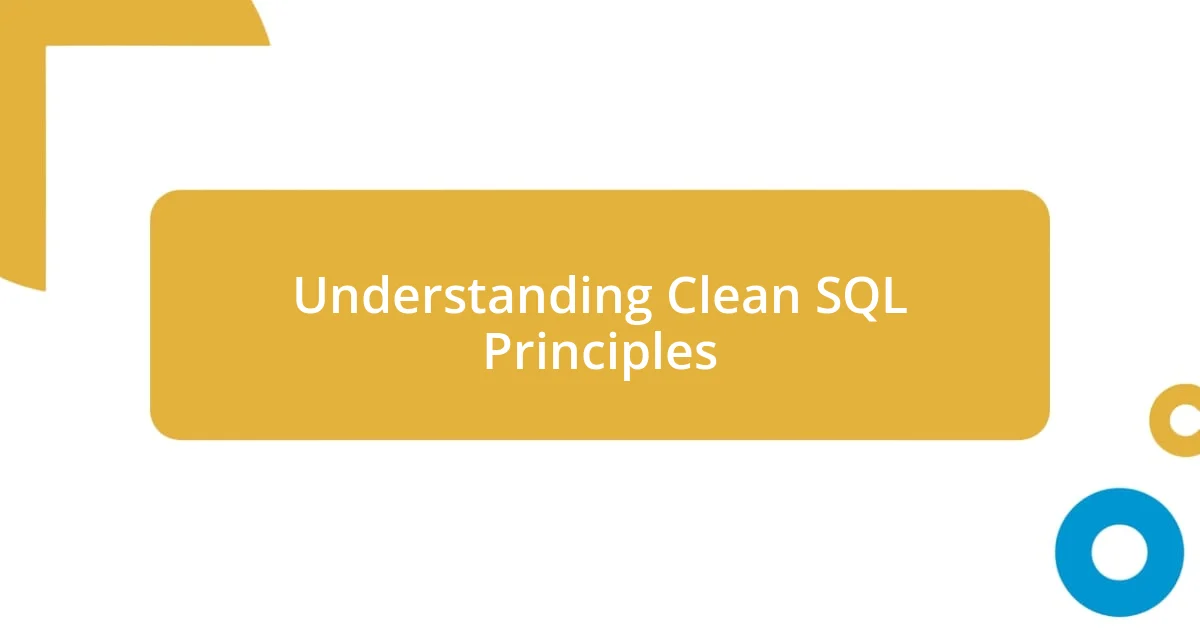
Understanding Clean SQL Principles
Clean SQL principles revolve around clarity, efficiency, and maintainability. For instance, I recall a time when I was working on a complex database query that was essential for a project deadline. I spent hours untangling syntax and structure, realizing that simpler, more direct code would not only save me time but also make future modifications easier—who hasn’t faced a query that felt like a tangled web?
Keeping your SQL organized is key to understanding and refinement, and I often find joy in naming conventions. When I aligned my table names and column titles to be intuitive and descriptive, it was like a weight lifted. Does it resonate with you, too? The moment I adopted this practice, it transformed how my colleagues and I navigated the code base, creating an environment where clean SQL quickly became a team norm.
Moreover, embracing the principles of normalization helped streamline my database design. I remember feeling overwhelmed by the redundancy in my data tables until I took a step back to apply these principles. Isn’t it liberating when you realize that by restructuring your data, not only do you reduce redundancy, but you also ensure data integrity? It’s a cathartic shift that fosters both confidence in your work and peace of mind.
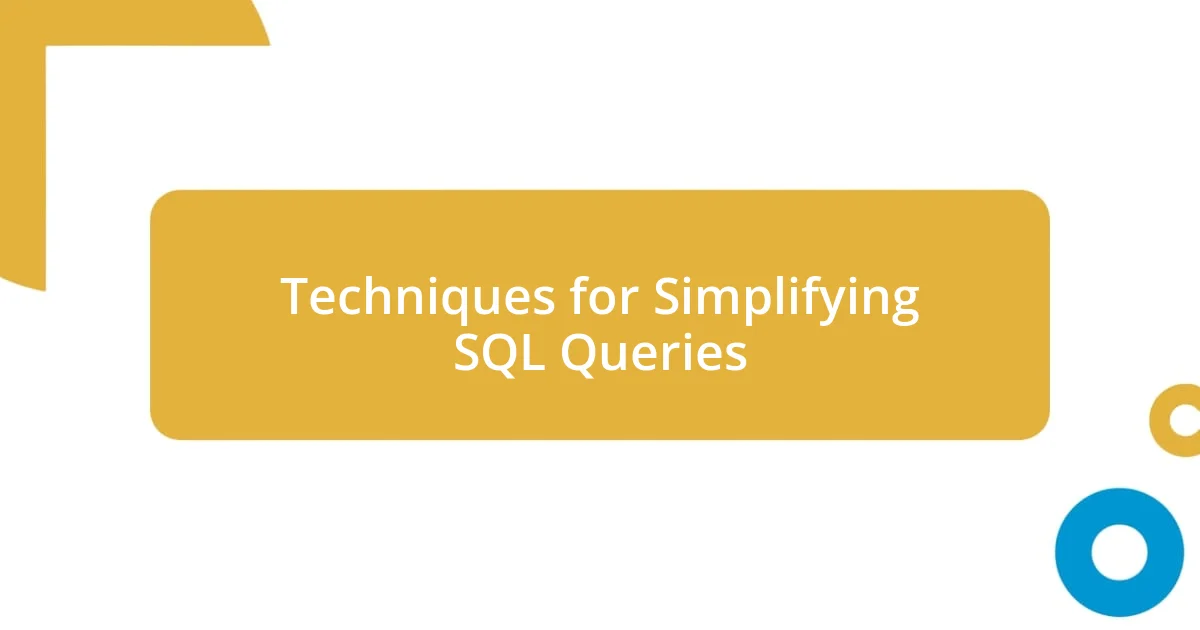
Techniques for Simplifying SQL Queries
Simplifying SQL queries is something I’ve learned to appreciate through experience. For me, breaking down complex queries into smaller, manageable pieces makes all the difference. I once tackled a query that spanned several hundred lines. I felt a wave of relief when I decided to break it down using common table expressions (CTEs). By doing this, I could focus on each segment individually, which not only made debugging easier but also enhanced the overall readability of my code.
Here are some techniques I find invaluable for simplifying SQL queries:
– Use CTEs: They help create more understandable structures by allowing you to build up queries step-by-step.
– Break down complex logic: Instead of cramming everything into a single statement, use multiple lines or even subqueries.
– Comment generously: I’ve found that adding comments clarifies intent, especially when returning to the code later.
– Limit required data: Using SELECT statements to fetch only necessary columns rather than SELECT * reduces confusion and improves performance.
– Consistent formatting: Indentations and spacing make it so much easier to follow the flow of the query.
I’ve often reflected on how a little bit of organization can lead to big wins. When I started aligning SQL formatting like aligning clauses with keywords or methodical capitalization, it transformed my experience. The joy I felt when a colleague quickly understood my thought process during a review was genuinely rewarding—it’s like speaking a common language where every element is connected and comprehensible!
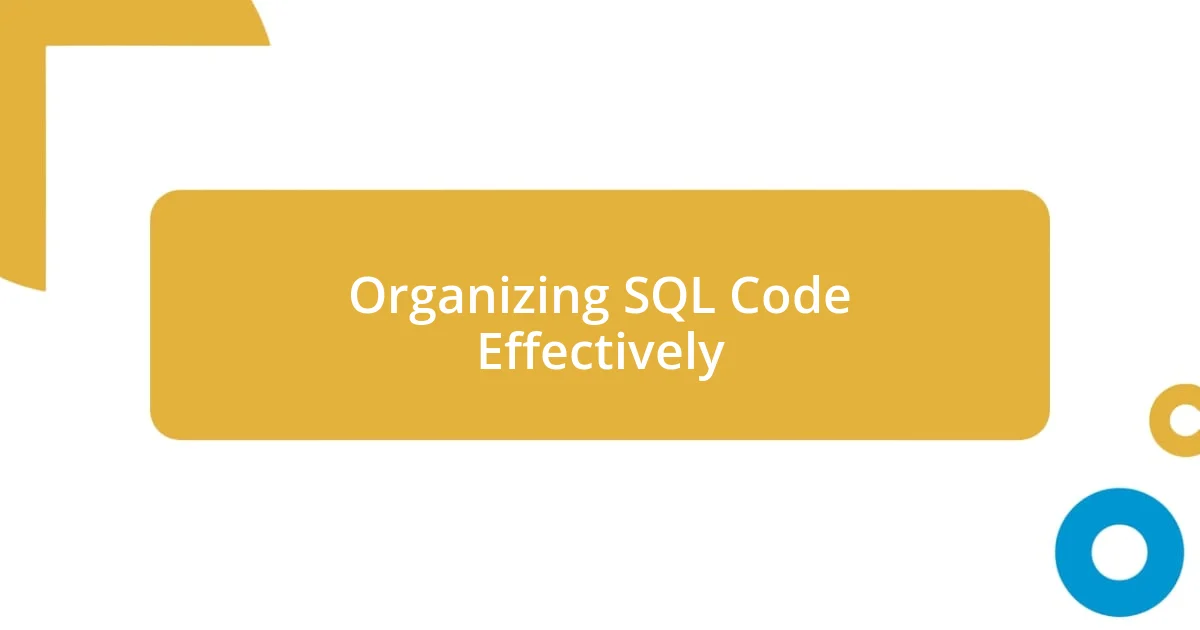
Organizing SQL Code Effectively
Keeping SQL code organized is not just a matter of aesthetics; it’s essential for long-term success in data management. I remember when I first entered the world of SQL; I would often clutter my scripts with ad-hoc queries that lacked clear structure. This chaos led to unnecessary confusion and mistakes. Once I started organizing my code with deliberate section breaks and titles—like “Data Selection” or “Joins”—the clarity was almost immediate. The simple act of categorizing my queries allowed me to track changes easily and collaborate more effectively with my team. Have you ever noticed the difference that a little structure can make?
Consistency is another pivotal aspect of organizing SQL code. Early in my career, I struggled with varying naming conventions, which made it difficult to maintain and update code. As I began to adopt a consistent naming system for tables and columns, I felt a newfound sense of control. Each time I returned to code, it was like visiting an old friend who greeted me with familiarity instead of confusion. Establishing a set standard not only benefits me personally but fosters an environment of collaboration where team members can easily connect with the database schema.
Lastly, separating queries into modular sections can have a profound impact on readability. I recall a project where I had to merge several datasets into one intricate report. Instead of having one monolithic query, I decided to structure it into smaller parts using temporary tables. The relief of being able to focus on one piece at a time—like assembling a puzzle—was immensely satisfying. Each segment flowed naturally into the next, making my overall workflow feel much more manageable and enjoyable.
| Best Practices | Impact |
|---|---|
| Use Clear Section Headings | Enhances readability and navigation |
| Maintain Consistent Naming Conventions | Improves collaboration and understanding |
| Break Queries into Smaller Parts | Eases debugging and enhances focus |
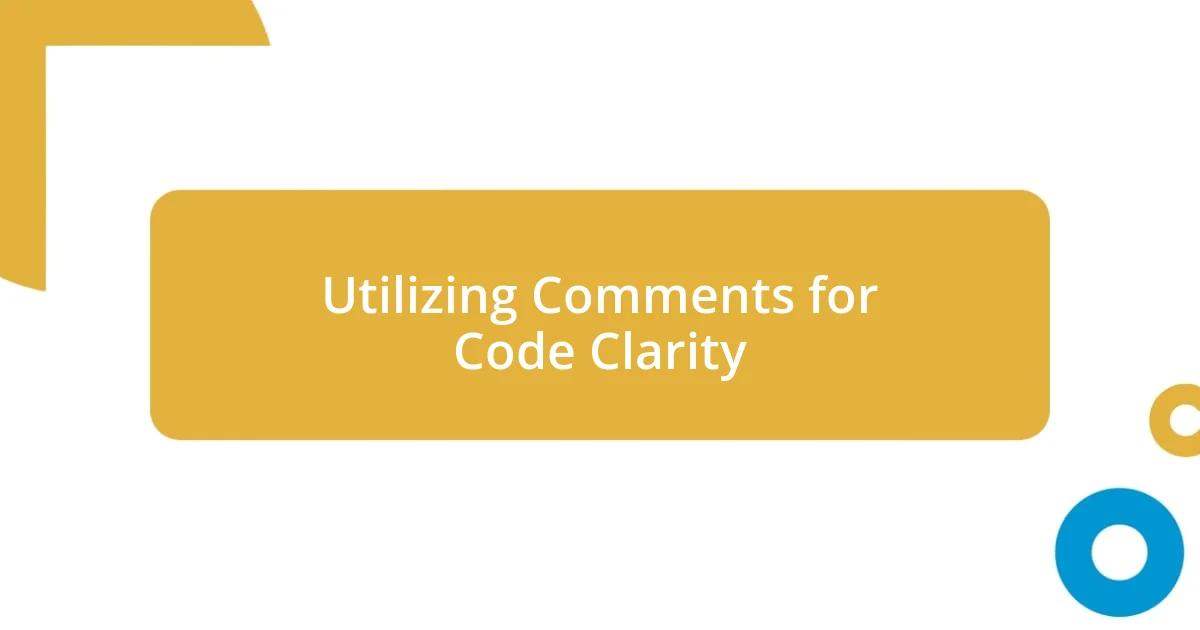
Utilizing Comments for Code Clarity
When it comes to writing clean SQL, I can’t stress enough the importance of comments. I remember a time when I returned to a complex query I had built months earlier, and I was genuinely baffled. It was then I realized that I had neglected to document my thought process. A few well-placed comments would have made it seamless to understand the logic behind my decisions. It’s like leaving breadcrumbs for your future self or for any teammates who might encounter your code.
I’ve also noticed that comments serve as an additional layer of communication not just with my future self but with others. For instance, I typically annotate tricky joins or calculated fields, explaining why I’ve structured them that way. This practice transformed a frustrating review process into a collaborative discussion. Have you ever faced a scenario where a well-placed comment saved you from a debugging nightmare? I have, and I can tell you from experience, it’s incredibly gratifying to see your intentions understood through your comments.
Committing to comment thoughtfully can seem like an extra step at first. But trust me, the benefits are profound. I recall getting feedback on a project where my comment clarity elevated the team’s ability to build upon my work. I felt relieved and proud knowing that my contributions were not just usable but understandable. Each comment became a touchpoint where my expertise met the reader’s curiosity. It’s incredible how a bit of clarity through comments can foster collaboration and comprehension within your team—don’t you think?
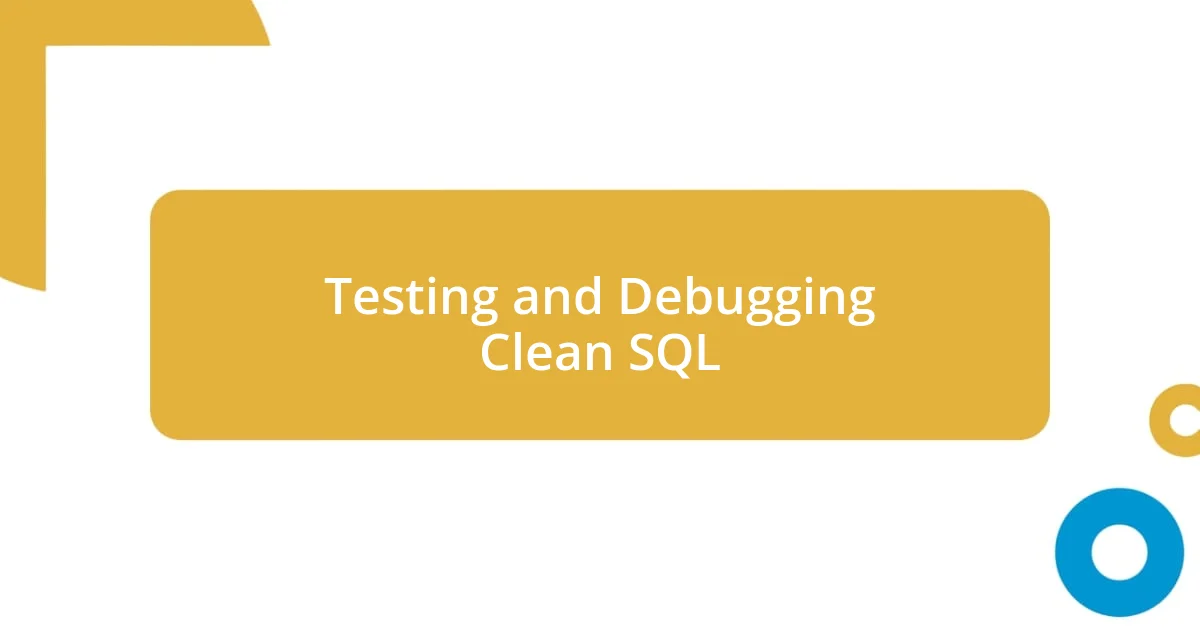
Testing and Debugging Clean SQL
Testing my SQL queries has always been a pivotal part of my development process. I vividly recall a time when I rushed a complex script into production without thoroughly testing it, only to discover a critical error that caused data inconsistencies. Since that incident, I’ve adopted a “test first” mindset. Each time I write a new query, I create a set of sample data to simulate various scenarios. This way, I can catch potential issues before they escalate into real problems. Isn’t it reassuring to know that taking a little extra time upfront can save you from major headaches down the road?
Debugging is another area where I’ve learned to fine-tune my approach. In one particular project, I was faced with a perplexing error related to a nested query. Rather than diving headfirst into the depths of the code, I took a step back and isolated each component, executing them sequentially. By doing this, I pinpointed the exact part that was causing the issue. This experience taught me the power of taking a methodical approach to debugging—after all, sometimes the best way to find a solution is to break things down into manageable pieces. Have you ever tried isolating issues like that?
I’ve also found that using automated testing tools can enhance confidence in my SQL scripts. There was a point in my career when I discovered a tool that allowed me to run regression tests on my queries. Implementing this into my workflow was a game-changer. Suddenly, I could ensure that my changes didn’t inadvertently break existing functionality. It’s fascinating how leveraging technology can amplify our ability to produce clean and reliable SQL. Have you considered integrating similar tools into your testing strategy? The investment can truly pay off in dividends, as it not only saves time but also boosts the quality of your work.
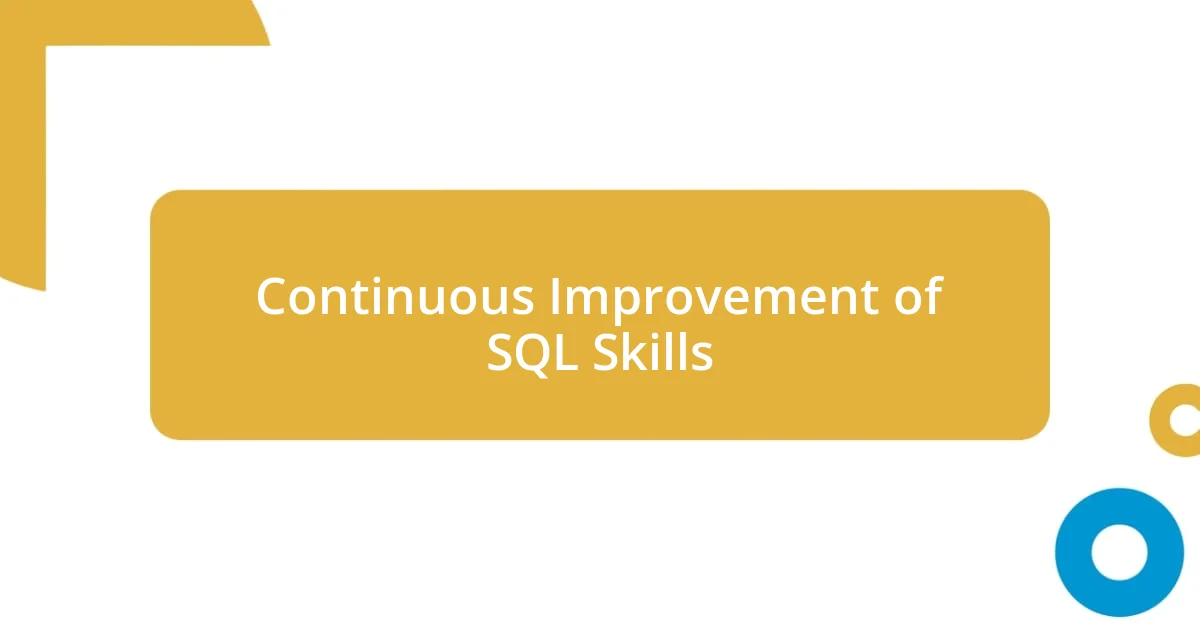
Continuous Improvement of SQL Skills
Continuous Improvement of SQL Skills
Improving my SQL skills has been a journey of constant learning and adaptation. I recall attending a workshop where the instructor shared advanced querying techniques that completely changed my perspective. It was like someone flipped a switch in my brain! That day, I realized how crucial it is to network and learn from others in the industry, whether through formal classes or community meetups. Have you ever walked away from a learning opportunity feeling inspired to apply new techniques?
Consistent practice is another key factor in my growth. I set aside time each week to tackle different SQL challenges—sometimes even threading them into my daily tasks. I remember the first time I attempted a complex data transformation; it felt overwhelming at first. But as I persisted, I began to see patterns and develop a rhythm. It’s remarkable how much more confident I feel now when handling intricate queries, knowing that each challenge builds upon what I’ve learned. Have you noticed progress in your skills through regular practice? I find it incredibly rewarding to see that effort pay off.
Lastly, seeking feedback has been a game-changer for me. I actively ask colleagues to review my work and share their insights. I can think of a project where my approach was challenged by a peer, leading to a deeper understanding of optimization techniques. Their perspective opened my eyes to possibilities I hadn’t considered. It’s fascinating how collaborative feedback can not only enhance the quality of code but also foster professional relationships. Have you engaged in such exchanges? Those conversations often lead to the most enlightening growth experiences in SQL.














